Archaeology
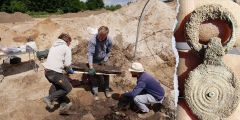
Jul 15th, 2025 - You can now listen to Fox News articles! Archaeologists recently uncovered a mysterious Roman-era settlement site in Germany, complete with building remains and hundreds of artifacts dating back nearly two millennia. The Schafbreite site, located within the western German town of Delbrück, has been settled since the first century A.D. The site was recently excavated by the Regional Association of Westphalia-Lippe (LWL). In a June 13 statement, the LWL announced the results of its ... [Read More]
Source: foxnews.com
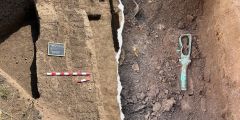
Jul 14th, 2025 - You can now listen to Fox News articles! Archaeologists recently uncovered multistory buildings from a lost Egyptian city in the Nile Delta, fostering new insights into urban life in antiquity. The ruins of the city – known in ancient times as Imet or Buto – are located at the site now called Tell el-Fara'in. The University of Manchester announced the discovery in a June 24 press release. Multiple excavations have taken place at the site in past decades, but the latest dig by ... [Read More]
Source: foxnews.com
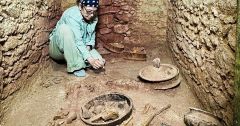
Jul 10th, 2025 - The tomb of a Mayan king has been discovered by Texas archaeologists in Caracol, Belize, marking the first time researchers in the ancient city have found a ruler's identifiable resting place. Caracol dates back to 900 B.C., according to the Caracol Archaeological Project , and lasted centuries until the collapse of the Maya civilization in A.D. 800-900. At its peak, the city had a population of over 100,000 people. Today, the city is the largest Mayan archaeological site in Belize, the project ... [Read More]
Source: cbsnews.com

Jul 2nd, 2025 - For the first time, scientists have sequenced a complete DNA set from an ancient Egyptian man, the oldest studied sequence, dating to when the pyramids were first constructed. The analysis, published in Nature on Wednesday, showed the remains belonged to a potentially well-regarded pottery worker — one who may have lived into his 60s. With DNA analysis that has until now been limited, the study reveals clues about people's movements around that time: Twenty percent of his ancestry showed ... [Read More]
Source: washingtonpost.com
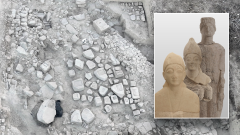
Jun 14th, 2025 - Archaeologists recently made numerous "spectacular" discoveries at a long-forgotten temple to an Ancient Greek god, according to local officials. The Department of Antiquities in Cyprus shared a Facebook post about the latest excavation on April 28. The site, the Sanctuary of Apollo at Frangissa, was first discovered in the 19th century before it was subsequently lost, the group said. Apollo, the god of archery and the son of Zeus, was venerated both in Ancient Greece and Ancient Rome . He was ... [Read More]
Source: aol.com

May 26th, 2025 - CAIRO (AP) — Egypt unveiled three new tombs of prominent statesman in the Dra Abu al-Naga necropolis in Luxor, officials said Monday. Egyptian archaeologists have discovered tombs dating back to the New Kingdom period (1550–1070 B.C.) and identified the names and titles of their owners through inscriptions found within, according to a statement by the tourism and antiquities ministry. The discovery comes in the lead-up to the highly anticipated full opening of the Grand Egyptian ... [Read More]
Source: pbs.org
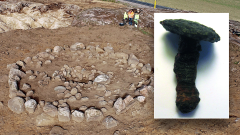
May 17th, 2025 - Swedish archaeologists recently found an "unusual" Viking-era coffin dating back over 1,100 years. The discovery was announced by Arkeologerna, an archaeological organization affiliated with the Swedish government, in April. The grave was found on the outskirts of Linköping, a city in southern Sweden, in fall 2022, though the find was unknown until last month. In a Facebook post, Arkeologerna said its archaeologists were investigating a stone quarry in the area when they came across the ... [Read More]
Source: aol.com
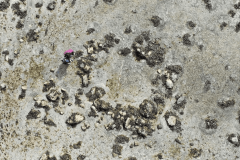
May 12th, 2025 - Scientists think Ice Age humans crossed to this Scottish island and stayed. The Isle of Skye is the largest and northernmost of the major islands in the Inner Hebrides of Scotland. And here, archaeologists have found signs of a journey that defies expectation. Thousands of years ago, long before the invention of farming or even before Stonehenge rose from the Salisbury plain, a band of hunter-gatherers arrived at what was then the edge of the known world. According to scientists writing in a ... [Read More]
Source: zmescience.com
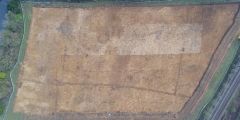
May 12th, 2025 - An ancient Bronze Age settlement was recently uncovered by archaeologists in the United Kingdom while a highway was being built. The Suffolk City Council described the site as a "Late Bronze Age settlement and cremation cemetery" that dates back 3,000 years; they shared the information in a press release dated mid-April. In Britain, the Bronze Age lasted from 2500 B.C. to roughly 800 B.C. The excavation took place on the construction site of Europa Way. The highway was built to link roads in ... [Read More]
Source: foxnews.com

May 1st, 2025 - The famous ancient Egyptian obelisk in Paris may contain a series of hieroglyphic messages aimed at Egypt's nobility that praise the pharaoh Ramesses II and say he was divinely chosen by the gods, an Egyptologist claims. However, scholars who were not involved with the research expressed caution about this interpretation. The approximately 3,300-year-old obelisk was built at Luxor Temple on orders of Ramesses II (who reigned circa 1279 to 1213 B.C.) at the beginning of his rule. In 1830, the ... [Read More]
Source: livescience.com

Apr 18th, 2025 - Archaeologists have long assumed that Stone Age tombs in Ireland were built for royalty. But a new analysis of DNA from 55 skeletons found in these 5,000-year-old graves suggests that the tombs were made for the community, not for a ruling dynasty. In Ireland's Neolithic period, which lasted from about 3900 to 2500 B.C., people built " megalithic monuments" — large stone structures that contained human bones and cremated remains. While the monuments clearly marked burials, archaeologists ... [Read More]
Source: livescience.com
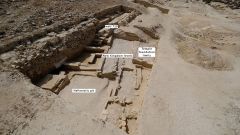
Apr 12th, 2025 - Archaeologists in Egypt have uncovered the remains of a "major" 3,400-year-old town dating to the New Kingdom that was possibly built by King Tutankhamun 's father and later added to by Ramesses II, a new study finds. The settlement was found at the site of Kom el-Nugus in northern Egypt, about 27 miles (43 kilometers) west of Alexandria on a rocky ridge between the Mediterranean Sea and Lake Mariout. Previously, Egyptologists thought the site was not inhabited until later times, when the ... [Read More]
Source: livescience.com

Apr 11th, 2025 - SO'OUD ATEN, Egypt — It's a familiar story: The whim of a leader upends citizens' lives and leads them into the wilderness. In ancient Egypt , Pharaoh Akhenaten was no different. Determined that his population should stop from worshipping multiple gods, more than 3,300 years ago he told residents to seal up their homes and workshops in the city of So'oud Aten with mud and clay bricks and move to a new home, a leading Egyptologist, Zawi Hawass, told NBC News last month. ... [Read More]
Source: nbcnews.com

Apr 4th, 2025 - Proof of an ancient garden, consistent with biblical scripture, has emerged at the holiest site in Christianity — and an archaeologist says "many surprises" from the site are in the works. Archaeologists excavating the Church of the Holy Sepulchre, the ancient church in Jerusalem situated where Jesus Christ was crucified and buried, recently found evidence of ancient olive trees and grapevines. The specimens date back roughly 2,000 years. The discovery echoes the New Testament verse John ... [Read More]
Source: foxnews.com
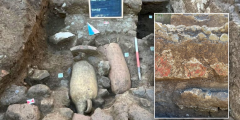
Apr 2nd, 2025 - Italian archaeologists recently unearthed ancient Roman tombs during the excavation of a necropolis – including one bearing the epitaph of a gladiator. The discovery was announced by the Archaeology, Fine Arts and Landscape (ABAP) Superintendence for the Metropolitan Area of Naples on March 21. In a statement translated from Italian to English, officials said that the dig took place in Liternum, an ancient town near the city of Giugliano in Campania. The excavation site was used as ... [Read More]
Source: foxnews.com
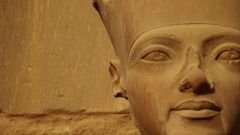
Apr 1st, 2025 - Ancient Egypt in North Africa was one of the most powerful and influential civilizations in the region for over 3,000 years, from around 3100 B.C to 30 B.C. It left behind numerous monuments, documents and works of art that continue to be studied by scholars today. However Egyptian civilization existed long before this period, and it has survived and flourished since. While the civilization's rulers, language, writing, climate, religion and borders have changed many times over the millennia, ... [Read More]
Source: livescience.com